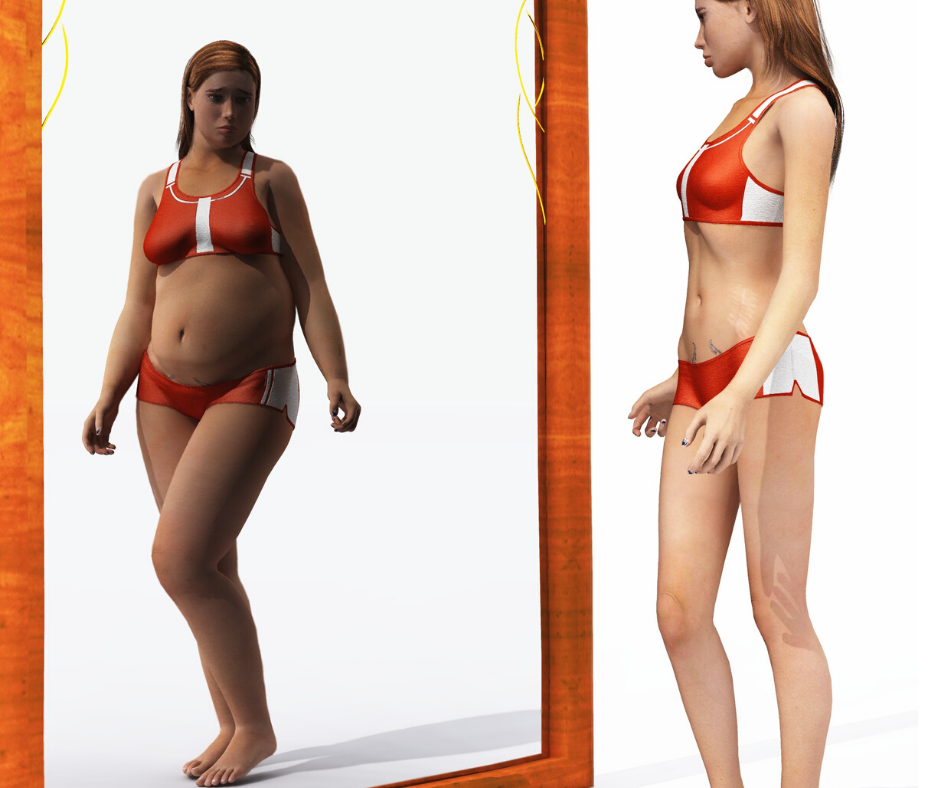From time to time, we all experience negative thoughts or feelings about ourselves. However, it is important to pay attention to when these negative thoughts and feelings become overwhelming or unbearable and begin to impact our daily lives. One example of how negativity can manifest is the development of an eating disorder.
In general, an eating disorder is the inability to engage with food in a healthy way. There are many different types of eating disorders and they can be difficult to identify because every person will exhibit different behaviors and different warning signs. In fact, some people with eating disorders may not exhibit any outward signs at all, but may be experiencing internal stomach cramps, gastrointestinal problems, and/or intense anxiety.
Although all types of eating disorders will show up differently, they may share some of the same warning signs. Usually, someone with an eating disorder will not show all of the warning signs and sometimes a person may not show any signs at all. But it is still important to notice if any of these symptoms are occurring because the earlier an eating disorder is detected, the higher the chance of a full recovery.
Below is a list of warning signs and indicators of an eating disorder. If you or someone you know is exhibiting any of these signs, please reach out and ask for help. A trained therapist is an excellent resource for this.
-
The biggest indicator of an eating disorder is a change in someone’s attitude about food. This change may be related to body image, eating habits, size, or weight but can also be related to personality – irritability, mood swings, or depression, for example.
-
Another sign is avoiding social activities, especially those where food may be present. Someone with an eating disorder will likely withdraw from friends and family and try to avoid eating with others.
-
Food rituals are also indicators that someone is attempting to exhibit control over food and food choices. Cutting food into small pieces, eating slowly and methodically, making sure no foods are touching, or the need to always leave half a plate of food unfinished are all food rituals that may be indicators of a larger food-related issue.
-
Obsession with body image. Obsessing about the way one looks, including shape and weight, constantly checking one’s reflection in the mirror, and overly comparing oneself to others are all signs of an unhealthy body image which may manifest in an eating disorder.
-
Body dysmorphia. This is a mental health disorder in which a person becomes overly focused on a pierced negative flaw in their body and can easily lead to unhealthy food compulsions. Body dysmorphia creates negative self-esteem and is likely to cause an unhealthy relationship with food.
-
Eating in secret, hoarding, or hiding food.
-
Obsessively exercising, for several hours a day or to the point of exhaustion, is another indicator that a person may be experiencing a body or food-related illness.
-
Binge eating, regularly overindulging to the point of sickness, and/or hiding food wrappers.
-
Disappearing after meals to go to the bathroom. This might signal that someone is purging after meals, which is a serious symptom of an eating disorder.
-
Preoccupation with fad diets and obsessing about meal plans, counting calories, or what foods are being “cut out” are also all signs that someone is experiencing an unhealthy relationship with food.
The above warning signs should be taken very seriously. However, any display of these behaviors does not necessarily indicate that someone has an eating disorder; each individual is unique and eating disorders will show up differently for all of us. In general, if you notice that a person’s attitude has become primarily focused on food or on losing weight, it may be a sign of a developing problem and it’s time to pay attention.
Remember, recovery is possible. The sooner someone gets help, the better. Eating disorders are life-threatening illnesses and should be taken very seriously. If you feel that you or someone you know may be experiencing a challenge in this area, please seek help immediately.
Reach out to the relationship therapy clinic and schedule a free 20-minute video consultation to learn more about online therapy
Meet with one of our compassionate online therapists
Begin online therapy and find relief from the symptoms of eating disorders.
Other Services offered at The Relationship Therapy Center in California:
In addition to online therapy, Our Sacramento area counseling clinics located in Roseville and Fair Oaks, CA are pleased to offer a variety of mental health services. At the moment, all our therapy services are being offered online to comply with social distancing and the stay-in-place order issued by the state of California. We will discuss the importance of self-care and emotional support to help you cope with eating disorders and to discover ways to find healthy ways of dealing with stress.
Eating Disorder therapy can be beneficial, with the right therapist. Our compassionate therapists are trained to walk you through the process and help you find healing and peace. Please contact our therapy office to learn more about the many ways we can help you and your loved ones heal, grow, and eat healthy.



